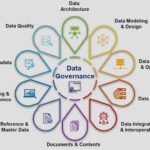Artificial Intelligence and Machine Learning Integration in Software
The integration of Artificial Intelligence (AI) and Machine Learning (ML) in software architecture is revolutionising the way practice systems are designed and operated. This article explores the impact of AI and ML integration and the synergy of AI and machine learning in modern software architecture, offering a glimpse into the future of intelligent software solutions.
Enhanced Decision-Making and Automation
AI and ML enable software systems to make informed decisions and automate complex processes. By analysing vast amounts of data, these technologies can identify patterns and insights that would be impossible for humans to discern quickly.

Adaptive and Predictive Systems
AI and machine learning enhance software functionality and algorithms allow software architectures to become more adaptive, learning from user interactions and evolving. This adaptability means that the system can predict user behaviour and preferences, offering a more customised and efficient user experience.
Enhanced User Experiences
AI and ML integration significantly enhances user experience by making software more intuitive and responsive. Features such as voice recognition, natural language processing, and image recognition contribute to creating more user-friendly and accessible interfaces, broadening the scope of user interaction with technology.

Real-Time Data Processing
The ability of AI and ML to process and analyse data in real-time has substantial implications for software architecture. This capability is critical in applications requiring immediate responses, such as fraud detection in financial systems or real-time monitoring in IoT devices.
The integration of AI and ML in software architecture represent a significant step forward in the evolution of technology. It offers unprecedented levels of automation, adaptability, and user engagement. As these technologies continue to advance and exploring the power of AI and machine learning in software design. They will play a crucial role in shaping the future of software development, offering more intelligent, efficient, and responsive systems.






























